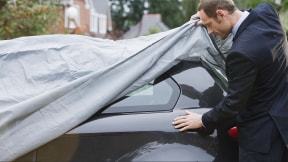Car noises and what they can tell you

Cars are complex machines that can produce a variety of noises from clicks and clanks to rattles and whines. Some of these car noises, like the gentle hum of tires rolling against pavement or side mirrors whistling in the wind, can be expected. Others, like grinding or humming noises, may signal a greater mechanical issue that needs to be addressed. Now, let’s cut through the noise and learn the possible culprits of some of the common (and unpleasant) car sounds.
Common car noise questions
While staying diligent with a routine maintenance schedule can help keep your car mechanically sound longer, general wear and tear can still lead to issues that might end up making themselves heard at some point. Identifying the source of unexpected car noises can get tricky — especially if the noise is the result of a combination of faulty mechanical components.
One of the most reliable ways to figure out why your car is making an unexplainable sound is through a professional car mechanic. Their training and experience diagnosing and correcting potential mechanical issues makes them well-qualified to help you get to the bottom of things. Still, curious minds might want to know, so while you wait for your car’s service appointment, here are a few possible answers to mull over.
Why is my car making a rattling noise?
Hearing a rattling noise is usually a signal that something is loose. If the rattling noise is coming from underneath your car, it could be stemming from:
- Loose exhaust components: A car’s exhaust system is comprised of several different bits and pieces that might loosen up over time and start to rattle — an unfixed tailpipe or muffler are two common potential culprits.
- Suspension issues: Your car’s suspension system is comprised of multiple pieces like shock absorbers, struts and bushings. When any of these components loosen (or wear out), you might start to hear some rattling noises from the front of your car, or underneath the cabin, especially when you drive on bumpy or uneven roads.
- Tire or wheel problems: Sometimes, rattling noises can ring out if something is lodged in the tire tread, a wheel bearing has unfixed itself or if your car is due for a tire realignment.
Why is my car making a clicking noise?
An unexpected clicking noise upon startup may be a sign that your car battery is dead or close to depleted. To test this out, give your car battery a jump and see if that eliminates the clicking noise when your car is turned on. If your battery isn’t staying charged, it could be an alternator issue instead. Other common problem starters include low oil pressure, faulty lifters or worn shock pads.
More car noise questions
If it's not a click or a rattle, it might be a squeak or a whistle. Here are a few potential explanations for other ear-ringing car noises.
Why is my car making a whining noise?
If you notice a whining sound when you turn your wheel, the issue could be that your power steering fluid needs a top-off. Without enough pressurized fluid, the hydraulic system fueling your power steering system can start to “whine” or “squeal” as its performance fails — in this case, you might also notice your wheel requiring more effort to turn. If this isn’t your experience and you hear a whining noise when you accelerate, it could be caused by a transmission issue, like a clogged fluid line or filter.
Why is my car making a squeaking noise?
If you notice squeaking or grinding noises when you hit the brakes, it could mean that your brake pads are starting to wear out. When this happens, the metal backing on the pads becomes exposed and starts to grind against the car’s rotors, reducing braking effectiveness and safety. This friction creates a sound that's tough on the ears and can eventually lead to brake failure if left unchecked. If the sound isn't coming from the brakes, other causes for squeaking noises may be from a worn-out suspension component or a misaligned belt.
Why is my car making a humming noise?
A low hum could simply be the sound of your tires rolling against pavement, but if the decibel level feels louder than expected, it might be coming from tire treads wearing out unevenly. Uneven treads typically happen when other components of your car struggle to perform, whether it be a weakened suspension, faulty wheel bearings or a myriad of other issues resulting in uneven wear patterns. If the humming noise is coming from under the hood, a struggling fuel pump or air conditioning system could be to blame.
Why is my car making a whistling noise?
Whistling noises could be the result of an issue with your car engine’s vacuum hoses, which your vehicle relies on to maintain the pressure required by internal combustion engines. If the vacuum hose becomes loose or is damaged, you might hear a high-pitch sound that mimics the vacuum you use at home — typically, this issue will also turn on your car dashboard’s “check engine” light. If the whistling noise isn’t coming from your vacuum hoses, it might be due to a worn turbocharger, a bad serpentine belt or a boost pipe leak.
As mentioned, these are only a few surface-level reasons you could be hearing an unusual car noise. If your car is making an uncomfortable sound, or if you notice your car underperforming, it’s safest to have your car checked by a professional mechanic, who’s trained to accurately diagnose and repair your vehicle properly.
In summary
Whether it’s a click, hum, whine or whistle, unexpected car sounds are likely to make anyone’s ears prick up. While keeping your car properly maintained can help promote a longer, healthier lifespan, the day might come when your car starts sounding a little bit off — if that happens, consider taking your car to a mechanic for a professional diagnosis and repair.



